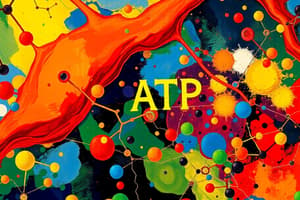Podcast
Questions and Answers
What is the primary function of catabolic pathways?
What is the primary function of catabolic pathways?
- To break down complex molecules into simpler ones, releasing energy (correct)
- To synthesize complex molecules from simpler ones
- To generate NADPH for redox reactions
- To regulate hormonal balance in the body
Which metabolic pathway generates NADPH and pentoses (5-carbon sugars)?
Which metabolic pathway generates NADPH and pentoses (5-carbon sugars)?
- Glycolysis
- Fatty Acid Oxidation
- Citric Acid Cycle
- Pentose Phosphate Pathway (correct)
What is the primary site of glycolysis?
What is the primary site of glycolysis?
- Golgi apparatus
- Mitochondrial matrix
- Cytosol (correct)
- Endoplasmic reticulum
What is the purpose of feedback inhibition in metabolic pathways?
What is the purpose of feedback inhibition in metabolic pathways?
Which of the following is an example of an anabolic pathway?
Which of the following is an example of an anabolic pathway?
What is the primary function of the citric acid cycle?
What is the primary function of the citric acid cycle?
What is the primary site of the citric acid cycle?
What is the primary site of the citric acid cycle?
What is the primary function of hormonal regulation in metabolic pathways?
What is the primary function of hormonal regulation in metabolic pathways?
Why are metabolic pathways important for cellular activities?
Why are metabolic pathways important for cellular activities?
What is the primary function of protein synthesis?
What is the primary function of protein synthesis?
Flashcards are hidden until you start studying
Study Notes
Metabolic Pathways
Definition
- A series of chemical reactions that occur within a cell to convert a molecule into another molecule
- Involves the transformation of energy and nutrients into the components that make up living organisms
Types of Metabolic Pathways
- Catabolic Pathways: Break down complex molecules into simpler molecules, releasing energy (e.g., glycolysis, citric acid cycle)
- Anabolic Pathways: Build complex molecules from simpler molecules, requiring energy (e.g., gluconeogenesis, protein synthesis)
Key Metabolic Pathways
- Glycolysis:
- Breaks down glucose into pyruvate
- Produces ATP and NADH
- Occurs in cytosol
- Citric Acid Cycle (Krebs Cycle or Tricarboxylic Acid Cycle):
- Breaks down acetyl-CoA into carbon dioxide
- Produces ATP, NADH, and FADH2
- Occurs in mitochondrial matrix
- Pentose Phosphate Pathway:
- Generates NADPH and pentoses (5-carbon sugars)
- Important for nucleic acid synthesis and redox reactions
- Occurs in cytosol
- Fatty Acid Oxidation (β-Oxidation):
- Breaks down fatty acids into acetyl-CoA
- Produces ATP and NADH
- Occurs in mitochondrial matrix
- Gluconeogenesis:
- Synthesizes glucose from non-carbohydrate sources (e.g., amino acids, lactate)
- Occurs in liver and kidney cells
- Protein Synthesis:
- Builds polypeptide chains from amino acids
- Occurs in ribosomes
Regulation of Metabolic Pathways
- Feedback Inhibition: End products of pathways inhibit earlier steps to prevent excessive production
- Allosteric Regulation: Enzymes are activated or inhibited by binding of molecules to specific sites
- Hormonal Regulation: Hormones (e.g., insulin, glucagon) stimulate or inhibit metabolic pathways
Importance of Metabolic Pathways
- Energy Production: Generate ATP for cellular activities
- Biosynthesis: Provide building blocks for the synthesis of macromolecules (e.g., carbohydrates, proteins, lipids)
- Homeostasis: Maintain cellular balance and regulate metabolic processes
Metabolic Pathways
Definition
- Metabolic pathways are series of chemical reactions within a cell that convert one molecule into another
- These reactions transform energy and nutrients into components of living organisms
Types of Metabolic Pathways
- Catabolic Pathways: Break down complex molecules, releasing energy
- Anabolic Pathways: Build complex molecules, requiring energy
Key Metabolic Pathways
Glycolysis
- Breaks down glucose into pyruvate
- Produces 2 ATP and 2 NADH
- Occurs in cytosol
Citric Acid Cycle (Krebs Cycle or Tricarboxylic Acid Cycle)
- Breaks down acetyl-CoA into carbon dioxide
- Produces 2 ATP, 6 NADH, and 2 FADH2
- Occurs in mitochondrial matrix
Pentose Phosphate Pathway
- Generates NADPH and pentoses (5-carbon sugars)
- Important for nucleic acid synthesis and redox reactions
- Occurs in cytosol
Fatty Acid Oxidation (β-Oxidation)
- Breaks down fatty acids into acetyl-CoA
- Produces ATP and NADH
- Occurs in mitochondrial matrix
Gluconeogenesis
- Synthesizes glucose from non-carbohydrate sources (e.g., amino acids, lactate)
- Occurs in liver and kidney cells
Protein Synthesis
- Builds polypeptide chains from amino acids
- Occurs in ribosomes
Regulation of Metabolic Pathways
- Feedback Inhibition: End products inhibit earlier steps to prevent excessive production
- Allosteric Regulation: Enzymes are activated or inhibited by binding of molecules to specific sites
- Hormonal Regulation: Hormones (e.g., insulin, glucagon) stimulate or inhibit metabolic pathways
Importance of Metabolic Pathways
- Energy Production: Generate ATP for cellular activities
- Biosynthesis: Provide building blocks for macromolecule synthesis (e.g., carbohydrates, proteins, lipids)
- Homeostasis: Maintain cellular balance and regulate metabolic processes
Studying That Suits You
Use AI to generate personalized quizzes and flashcards to suit your learning preferences.



